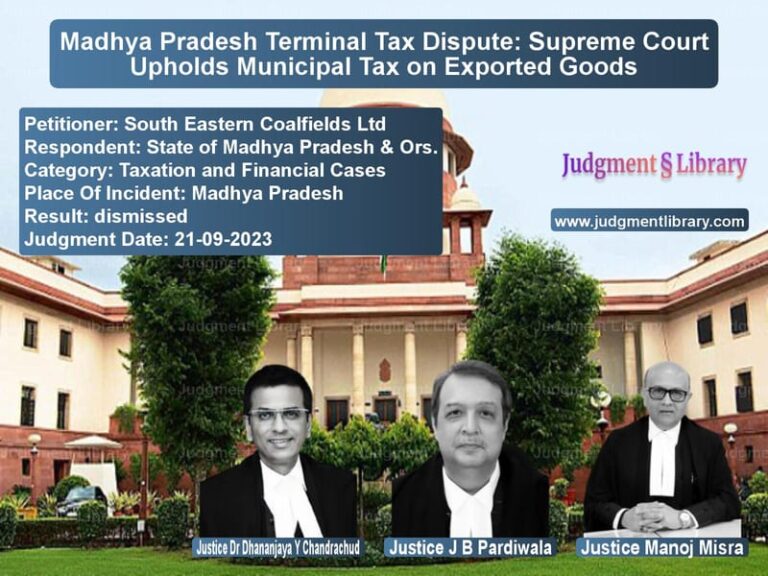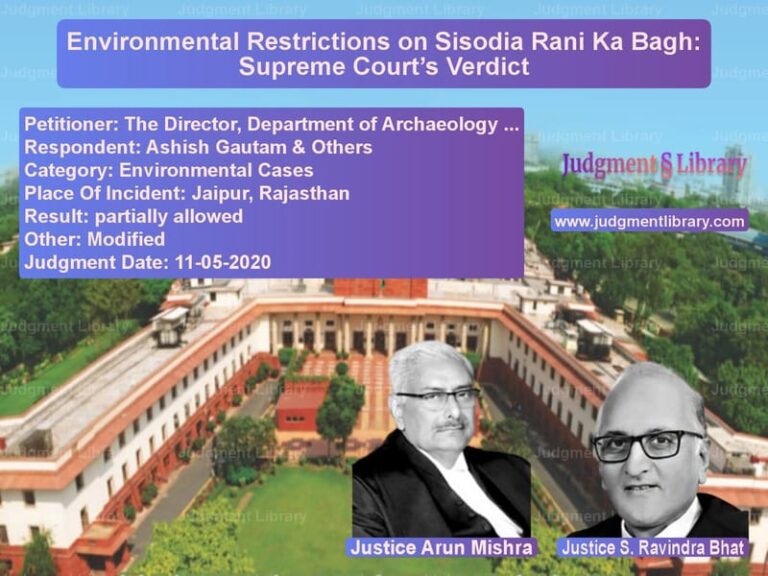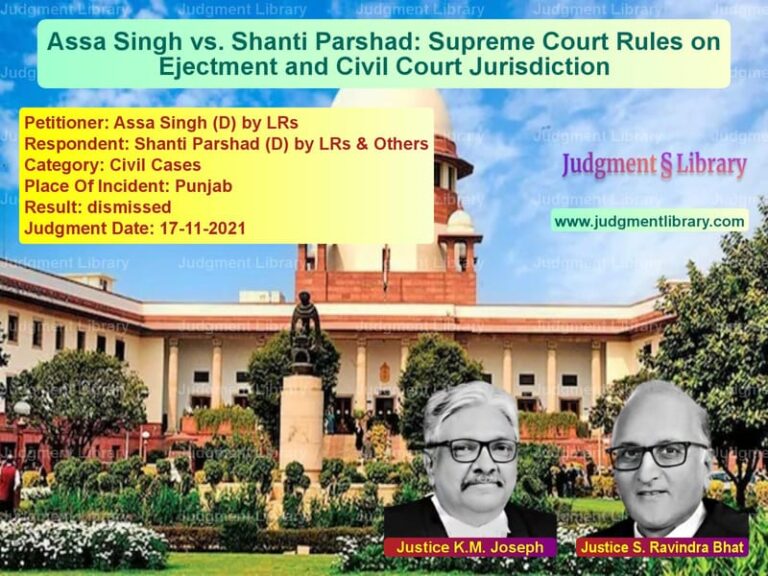Supreme Court Rules NBFCs Cannot Be Regulated by State Money Lending Laws
The Supreme Court of India has delivered a landmark judgment in the case of Nedumpilli Finance Company Limited vs. State of Kerala & Others, ruling that Non-Banking Financial Companies (NBFCs) regulated by the Reserve Bank of India (RBI) cannot be subject to regulation under state money lending laws. The judgment resolves a long-standing legal debate over whether state governments have the authority to impose additional regulations on NBFCs, which are already governed by Chapter III-B of the Reserve Bank of India Act, 1934.
Background of the Case
The case arose from conflicting rulings by the Kerala High Court and the Gujarat High Court regarding the applicability of state money lending laws to NBFCs. The Kerala High Court had ruled that NBFCs must comply with the Kerala Money Lenders Act, 1958, whereas the Gujarat High Court had held that the Gujarat Money Lenders Act, 2011 could not be applied to NBFCs as they were already regulated by the RBI.
Key Legal Issues
- Whether state governments have the legislative competence to regulate NBFCs under state money lending laws.
- Whether the RBI Act, 1934, provides exclusive regulatory control over NBFCs.
- The implications of state-level regulations on the national financial system.
Arguments by the Petitioners (NBFCs)
The NBFCs argued that:
- They are already regulated by the RBI under Chapter III-B of the RBI Act, 1934, which provides comprehensive oversight of their operations.
- State laws such as the Kerala Money Lenders Act and the Gujarat Money Lenders Act impose additional regulatory burdens that conflict with the RBI’s framework.
- NBFCs are financial institutions under Entry 45 of List I (Union List) of the Constitution, and thus only Parliament has the authority to regulate them.
- The RBI has a complete framework for regulating NBFCs, including capital adequacy requirements, licensing conditions, and operational guidelines, making state-level regulations redundant and inconsistent.
Counterarguments by the Respondents (State Governments)
The state governments of Kerala and Gujarat contended that:
- Their respective money lending acts are intended to protect borrowers from exploitation by money lenders, including NBFCs.
- Entry 30 of List II (State List) allows state legislatures to regulate money lending and money lenders, giving them the authority to impose licensing requirements and interest rate controls on NBFCs.
- The RBI does not regulate the interest rates charged by NBFCs, and therefore, state laws are necessary to prevent excessive interest rates and unfair lending practices.
- Since NBFCs engage in money lending, they fall within the definition of “money lenders” under state laws and should be subject to state regulation.
Supreme Court’s Observations
1. Exclusive Regulatory Authority of RBI Over NBFCs
“Chapter III-B of the RBI Act is a complete code in itself and provides the RBI with extensive regulatory control over NBFCs, covering their licensing, operations, and financial management.”
The Court emphasized that once Parliament has legislated comprehensively on a subject, state legislatures cannot impose conflicting regulations.
2. Conflict Between State Laws and the RBI Act
“When Parliament has enacted a law covering a specific subject matter, state laws that impose additional requirements are repugnant to the central law and must give way.”
The Court ruled that the Kerala Money Lenders Act and Gujarat Money Lenders Act were inconsistent with the RBI Act and, therefore, could not be applied to NBFCs.
3. Impact of State Laws on the National Financial System
“The RBI, as the central banking authority, ensures uniformity in financial regulation across the country. Allowing states to impose separate regulations on NBFCs would create regulatory chaos and undermine the RBI’s control over the financial sector.”
The judgment highlights the importance of maintaining a unified regulatory framework for financial institutions to prevent inconsistencies in the financial system.
Final Judgment
The Supreme Court ruled:
- The Kerala Money Lenders Act, 1958, and the Gujarat Money Lenders Act, 2011, are inapplicable to NBFCs registered under the RBI Act.
- The judgment of the Kerala High Court was set aside, and the appeals of the NBFCs were allowed.
- The Gujarat High Court’s ruling was upheld, and the appeals by the State of Gujarat were dismissed.
- The Court directed all state authorities to refrain from enforcing state money lending laws on NBFCs regulated by the RBI.
Impact of the Judgment
This ruling has several significant implications:
- Regulatory Clarity: The decision reinforces that the RBI has exclusive authority over NBFCs, preventing states from imposing additional regulatory burdens.
- Protection of NBFCs: The ruling ensures that NBFCs will not be subjected to conflicting state-level regulations that could hinder their operations.
- Uniformity in Financial Regulation: By upholding the primacy of the RBI, the judgment maintains a consistent financial regulatory framework across India.
- Judicial Precedent: This case sets an important precedent for future disputes concerning the overlap between central and state regulatory powers.
With this judgment, the Supreme Court has reaffirmed the primacy of the RBI in regulating NBFCs, ensuring that financial institutions operate within a unified national framework rather than being subjected to varying state laws.
Petitioner Name: Nedumpilli Finance Company Limited.Respondent Name: State of Kerala & Others.Judgment By: Justice V. Ramasubramanian, Justice Hemant Gupta.Place Of Incident: Kerala, Gujarat.Judgment Date: 10-05-2022.
Don’t miss out on the full details! Download the complete judgment in PDF format below and gain valuable insights instantly!
Download Judgment: nedumpilli-finance-c-vs-state-of-kerala-&-ot-supreme-court-of-india-judgment-dated-10-05-2022.pdf
Directly Download Judgment: Directly download this Judgment
See all petitions in Company Law
See all petitions in Corporate Compliance
See all petitions in unfair trade practices
See all petitions in Judgment by V. Ramasubramanian
See all petitions in Judgment by Hemant Gupta
See all petitions in allowed
See all petitions in supreme court of India judgments May 2022
See all petitions in 2022 judgments
See all posts in Corporate and Commercial Cases Category
See all allowed petitions in Corporate and Commercial Cases Category
See all Dismissed petitions in Corporate and Commercial Cases Category
See all partially allowed petitions in Corporate and Commercial Cases Category







